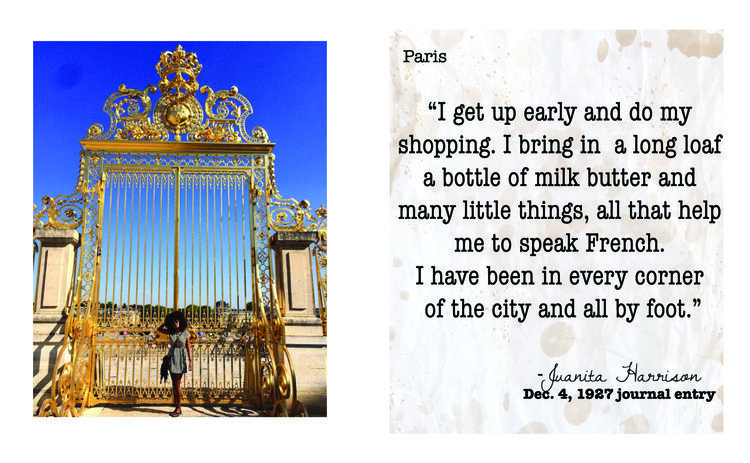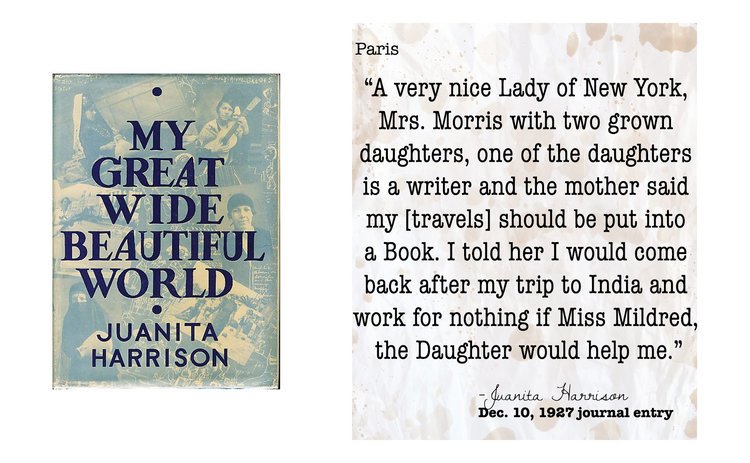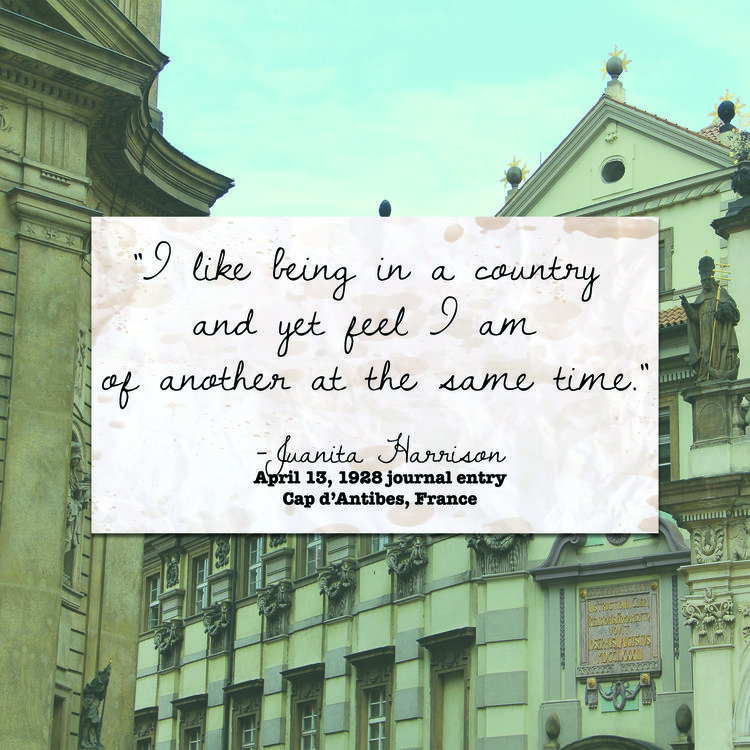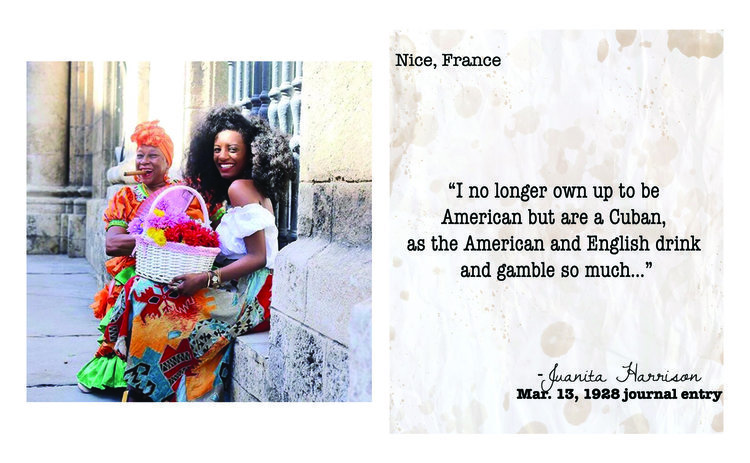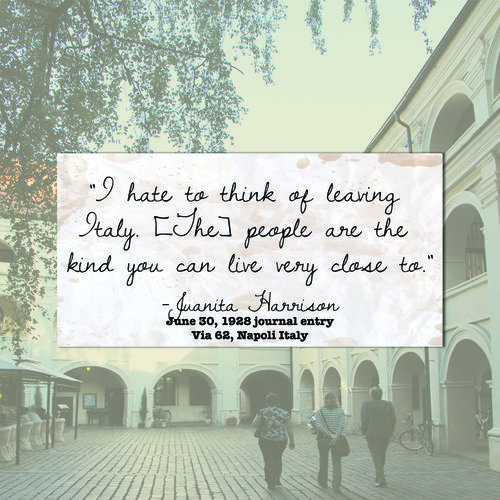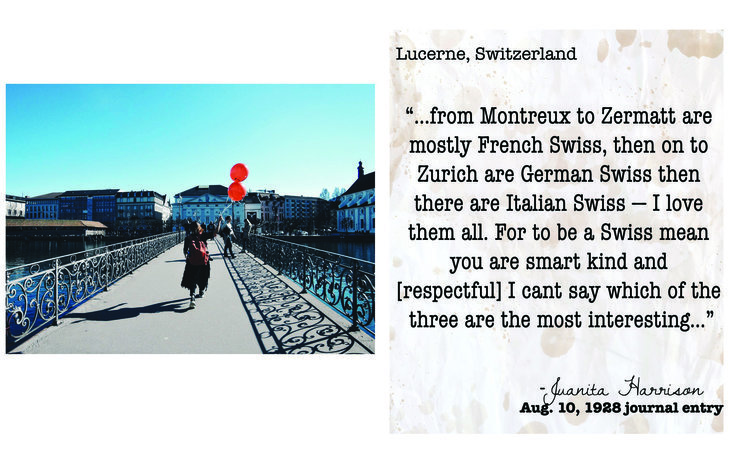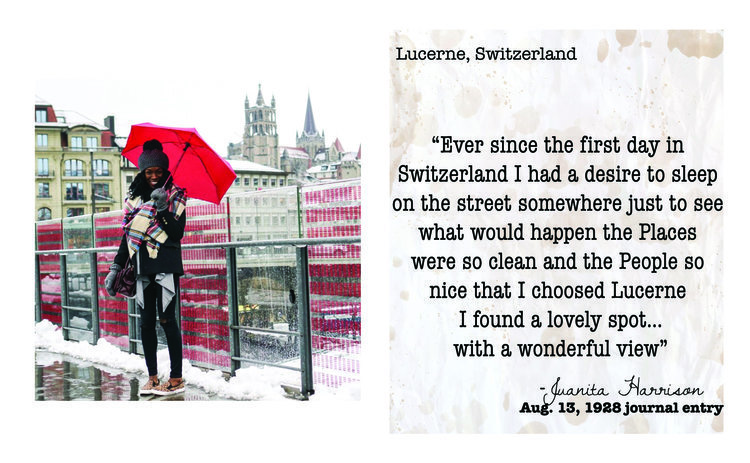Juanita Harrison, 2
Creative director and visual storyteller Asiyami Gold in London.
I cannot stress enough how amazing it is that someone such as Juanita Harrison lived the life that she did and DOCUMENTED as she went. What a treasure she left behind! I doubt she could have ever envisioned a world where people that looked like her traveling was the norm and not the exception. And yet in her own way Juanita Harrison had a hand in creating it for us.
This fearless woman set a precedent for women of color traveling the world.
Bahamian Artist Philece R. in Versailles, France.
Juanita demonstrated this idea of Journeying Soulfully that I'd like to see expounded upon in our everyday jargon about the journey and even travel: "lending" ourselves to places, letting places and spaces "borrow" us...not looking to participate in the possessiveness of "belonging" or spending all our lives searching for situational patriotism when we're meant for metamorphosis and transformation that disqualifies us from stagnancy and "staying put;" settling.
(image from Soul Society)
Juanita's gypsy-like lifestyle off taking up and moving on is a string of decisions we all can make in our minds on a daily basis. We can find freedom by creating experiences for ourselves in persistently foreign spaces; in being the "other" as a lifestyle, not as a moment before we start blending in.
Her unattachment to place and person is worth emulation in our soulful journeys, as it demonstrates the violent focus we must have on who we are and the woman we wish to be, no matter how beautiful or dynamic a place may be to us. No matter how pretty the landscape or how interesting the people, Juanita remained temporary and allowed that to cultivate her freedom and take her all around the world for over a decade.
“what matters most: when it’s all over will you be able to tell the story?”
Teastained traveler Abyssinia in Cuba
Reading through Harrison's writings we see this theme of constantly pushing towards foreignness, this pursuit of juxtaposing her identity with another culture and exploring that "otherness" so as to create experiences and build upon them in the next place.
Yours truly, in Chamonix, France, 2012
Juanita was a cross-cultural alchemist; a chemical engineer of situation and person and Black femaleness who documented the successes of mixing herself with the sociocultural, socioeconomic chemical compounds of the environments each country she visited provided her.
This liberal self-experimentation is the essence of Journeying Soulfully.
Rae Hong in Switzerland
Teastained traveler Tola in Casablanca, Morocco.
Furthermore, we see this embrace of a malleable identity: where Juanita Harrison allowed herself to be so entrenched in the local culture to the point in which she'd detach herself from the "American" identity and allow herself to be mistaken for another culture altogether.
I find I’m more attracted to such of Juanita's curious explorations of her ever-transforming surroundings. I see her maturity in curating meaningfulness in her tourism by lending her nativity to various spaces and then pulling it back with stinginess so that she can carry on. Her agency and self-sufficiency are intriguing.
“as you are traveling through life, journeying soulfully, let go of the map, embrace the possibility in the unknown beyond you, and keep your imagination alive with illustrious ideas of all the places your purpose can inhabit next”
Harrison's stealthy independence in nomadity reminds me of Vagabroad Journals' “Saffrron Woman” collection of Mantra Cahiers. This collection approaches the persistent theme exhibited in Juanita Harrison's life and journal entries: intentionally making one's self foreign to the “culture” of one circumstance so you can identify with who you really are and keep moving forward.
When we exercise the metaphor of engaging our world in different lights, we are able to see ourselves in different definitions, freeing ourselves from being owned or "belonging" to a place in life. We gain insights and context that validates our persevering forward.
Through Harrison's travel entries we witness the value in not limiting our mind and body to events and characters that look and sound like us. As Bill Watterson's comic strip character so famously states: "There's treasure everywhere!" We never know where we’ll find that thing that connects us with our core, our identity. The most unusual of places can confront us with the rhythm of our vibe. As Juanita demonstrates in her travels, it's the freedom of engaging with this unusual that enables us to discover ourselves.
I would have loved to have known and travelled with Juanita Harrison–not that she seemed like the sort who needed company when she traveled. Witty and determined, the tone of Juanita’s entries lets anyone reading them know how organically, how free-spiritedly she created her experiences.
Departure and arrival in travel and in life teaches us to celebrate all the sorts of people that exist in the world; all the people with whom we have the opportunity to alchemize. We can't take documenting any aspect of it for granted, no matter how quirky our written voice.
This leads me to addressing Ms. Harrison’s journal in all of its vernacular naiveté, simplicity…I’m so grateful that the editors didn’t “correct” the elementary lack of sophistication in her journal entries, or seek to add some level of academic elegance to her writing. It would have stripped away the character--Juanita's character!- and ultimately her voice. Many today would call it full of “errors,” “bad” English or the talk of “uneducated” people. However, I admire that Harrison never let her 4th grade education (the only education we know she attained) keep her from journaling her travels.
“from reading through juanita harrison’s journal i’ve learned that if we concern ourselves with being grammatically correct as opposed to honoring the flow of our language and it’s typographical aesthetics—then we will lose our voice.””
It's because of Juanita's "bad" grammar and "poor" spelling that I know how she might have sounded when she spoke. Her "illiteracy" allows for the expansion of my literacy and imagination. I can hear her... I meet people every day who tell me that they could never keep a journal because they don’t like their handwriting or they’re not “A WRITER”. They’ve lived beauty and breathed soul; survived mountains and pioneered expanses and none of it is written down; it’s as if their own life doesn’t know they ever existed.
But then I think of women such as Juanita Harrison who, although she wasn’t writing during the Civil Rights Era, was fascinated at the concept of her words -in all of their lack of grammar and spelling rules- making it into a book. She-in all of her “bad” writing- wanted to write! Here is a woman who could barely write in her native tongue, holding onto hope to write and publish a book.
Thinking about Juanita’s eudaemonia and determination makes me want to make journals with the hopes that even just one would embrace the opportunity presented to us when we pick up a pen and write about who we are and what surrounds us, be it palm trees and sand or abusive fathers and mindsets that keep us in negative cycles.
At this point in history we must do more to honor our literacy. I don’t care how badly you write. Write your narrative. Someone needs to know all the places you have been.
The opportunity to publish her own book elated Juanita, inspiring her to keep detailed record of all she'd see and experience along her trip.



